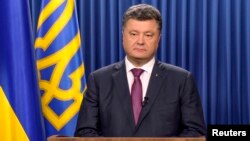President Petro Poroshenko dissolved Ukraine's parliament on Monday and announced an election on Oct. 26 in the country that is fighting a war against separatists that has driven relations with Russia to an all-time low.
Poroshenko's decision had been expected after the governing coalition in Ukraine - which ousted its Moscow-backed president in street protests in February precipitating the separatist rebellions in its eastern regions - collapsed on July 24.
Poroshenko and his government, whose pro-Europe policies have riled the Kremlin, hope to stabilize the situation in the east by October sufficiently to hold a relatively normal election that will earn them greater legitimacy and strengthen their hand in dealing with Russia.
“I have taken the decision to dissolve parliament for elections on October 26,” Poroshenko said in a Twitter post in which he urged all Ukrainians to turn out.
He and his liberal supporters will be seeking an endorsement of the tough line they have taken in the separatist war and their European integration policies which have brought confrontation with Russia.
Moscow, angered by the ousting of Yanukovich who fled following the deaths of more than 100 protesters killed in Kyiv by police snipers, annexed Ukraine's Crimean peninsula in March.
Poroshenko's leadership accuses Moscow of being behind the separatist rebellions in Ukraine's Russian-speaking east which broke out shortly afterwards, though Moscow denies this.
In a statement to compatriots on his website on Monday night, Poroshenko hoped the election would clear out many of the “old guard” who supported Yanukovich and produce a coalition able to push through vital economic and political reform after years of corrupt misrule and malpractice.
“The present parliament for a year-and-a-half was a support for Yanukovich. And the majority of precisely these deputies adopted dictatorial laws which took the lives of 'Heaven's Hundred',” he said referring to the protesters who were killed and who have now acquired martyr status in Kyiv.
“Someone has to take responsibility for this - criminal and political,” he said.
He accused some deputies of backing the separatists.
“Many deputies are, if they are not the direct sponsors and associates, the supporters of the separatist fighters,” he said. “I consider victory in the Donbass and the victory of democratic reforming forces in parliament a mutually linked process.”
Donbass is the name given to the industrialized and mainly Russian-speaking east of Ukraine, where two regions - Donetsk and Luhansk - have declared independence from Ukraine in an attempt to join Russia.
Minsk meeting
Poroshenko heads for the Belarussian capital of Minsk on Tuesday for his first meeting with Russia's Vladimir Putin since June.
The timing of his election announcement was intended to broadcast to Putin and European Union officials, who will also be present in Minsk, that Ukraine was steadily normalizing and building democratic structures after the malpractice of the Yanukovich years.
But with Kyiv angered over reports of Russian armored vehicles coming across the border on Monday with the aim of opening a new front in the separatist war the prospects of a breakthrough in Minsk appear slim.
Another convoy of humanitarian aid
Earlier Monday, Poroshenko said he is extraordinarily concerned about what he said are Russian military moves into the east.
Ukrainian officials said Russian tanks and armored vehicles crossed into southeastern Ukraine Monday, bearing flags of pro-Russian separatists.
Poroshenko's office says he told European Council President Herman Van Rompuy by telephone Monday that he also is concerned about Russian plans to send another convoy of purported humanitarian aid into Ukraine.
Russia last week sent more than 200 trucks it says were packed with aid into Ukraine.
The Kyiv government did not approve the shipment and called it a Russian invasion. It also said Russia did not wait for the Red Cross to complete its inspection.
When asked about the convoy, Russian Foreign Minister Sergei Lavrov said he had not heard about it, and added "there is plenty of misinformation" about incursions.
Lavrov said Russia wants to send the second convoy as soon as possible. He said Russia wants to reach an agreement on "all conditions" for delivering the new round of aid on the same route as the first.





